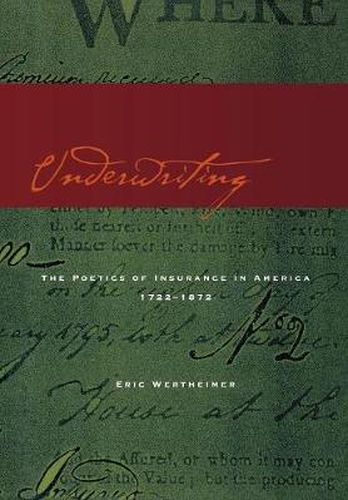Readings Newsletter
Become a Readings Member to make your shopping experience even easier.
Sign in or sign up for free!
You’re not far away from qualifying for FREE standard shipping within Australia
You’ve qualified for FREE standard shipping within Australia
The cart is loading…






This book focuses on the way literary texts articulate embedded cultural assumptions about monetary value and reflect the logic of certain economic practices. In its simplest formulation, Underwriting is an investigation of the cultural history of insurance in early America. It seeks a large part of that cultural history in the lives and works of five American authors of the eighteenth and nineteenth centuries: Benjamin Franklin, Phillis Wheatley, Noah Webster, Herman Melville, and Ralph Waldo Emerson. It hinges on an odd-sounding assumption: that insurance, as a textual procedure requiring signatures to conserve property, is a writing business, theoretically and practically. Insurance articulates a nexus (in the form of contractual and monetary obligations) between property and text, attempting to mark and reconcile with its voracious application of assurances these two cornerstones of capitalist logic. The plot of Underwriting that Wertheimer pursues is then manifold: a meditation on theories of writing; a cultural and social history of the practices that make mutually defining modes of loss and reparation profitable and pleasurable; and a reading of certain literary texts that might lead us to new understandings of the relationship between artistic and commercial discourses in America.
$9.00 standard shipping within Australia
FREE standard shipping within Australia for orders over $100.00
Express & International shipping calculated at checkout
This book focuses on the way literary texts articulate embedded cultural assumptions about monetary value and reflect the logic of certain economic practices. In its simplest formulation, Underwriting is an investigation of the cultural history of insurance in early America. It seeks a large part of that cultural history in the lives and works of five American authors of the eighteenth and nineteenth centuries: Benjamin Franklin, Phillis Wheatley, Noah Webster, Herman Melville, and Ralph Waldo Emerson. It hinges on an odd-sounding assumption: that insurance, as a textual procedure requiring signatures to conserve property, is a writing business, theoretically and practically. Insurance articulates a nexus (in the form of contractual and monetary obligations) between property and text, attempting to mark and reconcile with its voracious application of assurances these two cornerstones of capitalist logic. The plot of Underwriting that Wertheimer pursues is then manifold: a meditation on theories of writing; a cultural and social history of the practices that make mutually defining modes of loss and reparation profitable and pleasurable; and a reading of certain literary texts that might lead us to new understandings of the relationship between artistic and commercial discourses in America.